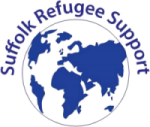Background
We are a charity and a company limited by guarantee, established in 1999 by concerned local people who realised that numbers of asylum seekers and refugees were arriving in Suffolk, particularly in the Ipswich area, and that there was a need for advice, advocacy and practical support. We have developed our services over the years in response to the needs of our clients (see What We Do page for more details). We are an independent charity whose purpose is to ensure that all asylum seekers and refugees in Suffolk are enabled to live integrated, fulfilled and contributing lives in their new communities.
Who are Refugees and Asylum Seekers?
A refugee is someone who has been forced to leave their country in order to escape war and persecution. Their own government is unwilling or unable to protect them and they are unable to return home until conditions are safe for them again.
The 1951 Refugee Convention defined a refugee as someone who has a well-founded fear of persecution for reasons of race, religion, nationality, political opinion or membership in a particular social group.
In the UK a person granted refugee status is normally given five years leave and then they can apply for indefinite leave to remain.
An asylum seeker is someone in the process of claiming protection in another country. Once an asylum claim is recognised by a host country then they can live in their host country as a refugee.
Everyone has the right to seek asylum – it is recognised as a universal human right.
Asylum seekers are not required to claim asylum in the first safe country they reach.
There are no safe, legal routes for people to reach the UK for the purposes of claiming asylum.
International situation
- At the end of 2022, 108.4 million people worldwide were forcibly displaced from their homes as a result of persecution, conflict, violence and human rights violations
- This is an increase of 19 million people compared to the end of 2021 – the largest ever increase between years
- Of this record total, 36 million are refugees (the remainder are internally displaced), and 43 million are children
- More than 1 in every 74 people on Earth has been forced to flee their home
- 70% of refugees worldwide live in neighbouring countries (for example, Jordan hosts 1.3 million refugees from Syria)
- 76% of refugees are hosted by low and middle income countries – Turkey is the biggest host of refugees
- Over half of all refugees in the world come from three countries – Syria, Ukraine and Afghanistan
- 149 countries have agreed to protect refugees under the 1951 Refugee Convention
- The UK was one of the first group of 28 countries to sign the Convention in 1951
UK situation
- According to the UNHCR, there are 328,989 refugees in the United Kingdom (2022). That means refugees make up less than half a percent of the population (0.49%).
- By the end of 2022, over half of the refugees living in the UK came from Ukraine (55%), with others coming from Iraq, Iran, Eritrea, Syria, Sudan and Afghanistan
- More than 170,000 Ukrainian refugees have come to the UK under the Homes for Ukraine and Ukraine Family Schemes since the war started in February 2022
- Around 20,000 Syrian and 20,000 Afghan refugees have been resettled to the UK in recent years
- There were 75,000 asylum applications (relating to 93,296 people) in the UK in the year ending September 2023 (a 1% increase on the previous year)
- The UK ranks 20th in Europe in terms of asylum applications per head of population
- 75% of initial asylum decisions made in the year to September 2023 were grants of protection, meaning people were awarded refugee status or humanitarian protection
- In the year ending June 2023, people arriving irregularly in the UK (e.g. by small boat) made up less than 5% of overall immigration figures
- Asylum seekers are generally not allowed to work in the UK. Those living in hotels receive £8.86 per week, and those in ‘dispersal’ accommodation £49.19 per week.
Local Situation
Suffolk is home to settled refugee communities, many of them established over the past 25 years with the majority living in Ipswich. For historical reasons, the largest community is Kurdish. Many of these people have British citizenship, refugee status or leave to remain in the UK.
There are also asylum seekers, predominantly in family groups, housed in Ipswich under the government’s ‘dispersal’ system. These people come from a range of countries and all are awaiting a decision on their asylum claim. In addition, over recent years Suffolk has hosted an increased number of Unaccompanied Asylum-Seeking Children (UASCs).
Suffolk is also taking part in the government’s refugee resettlement schemes- the UK Resettlement Scheme (UKRS) and ARAP/ACRS schemes for Afghan refugees. Suffolk Refugee Support is contracted to provide specialist casework for families and individuals arriving in Suffolk under both resettlement programmes as well as providing practical support and advice to Ukrainian refugees arriving in Suffolk under both the Ukraine Family Scheme and Homes for Ukraine scheme.
In Suffolk there are currently:
An estimated 2500-3000 settled refugees – with the largest community being Kurdish
Approximately 1100 Ukrainian refugees under the Homes for Ukraine scheme (plus those here under the Ukraine Family Scheme)
Around 300 UASCs (unaccompanied asylum seeking children) and care leavers
Approximately 60 people in asylum ‘dispersal’ accommodation in Ipswich, mostly families
Around 300 refugees here under UK government resettlement schemes – predominantly Syrian and Afghan and almost all in family groups
